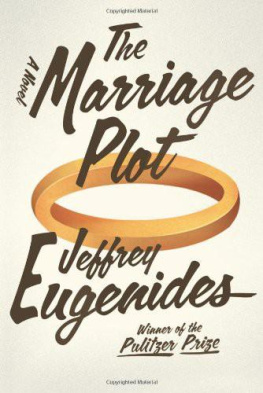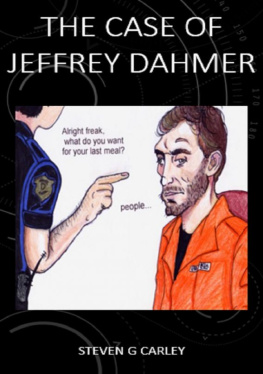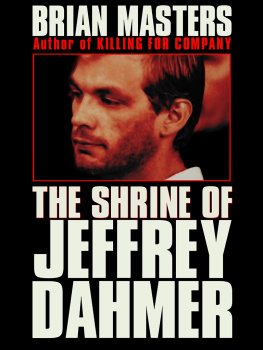Jeffrey Eugenides - Middlesex
Here you can read online Jeffrey Eugenides - Middlesex full text of the book (entire story) in english for free. Download pdf and epub, get meaning, cover and reviews about this ebook. year: 2002, publisher: Farrar, Straus and Giroux, genre: Detective and thriller. Description of the work, (preface) as well as reviews are available. Best literature library LitArk.com created for fans of good reading and offers a wide selection of genres:
Romance novel
Science fiction
Adventure
Detective
Science
History
Home and family
Prose
Art
Politics
Computer
Non-fiction
Religion
Business
Children
Humor
Choose a favorite category and find really read worthwhile books. Enjoy immersion in the world of imagination, feel the emotions of the characters or learn something new for yourself, make an fascinating discovery.
- Book:Middlesex
- Author:
- Publisher:Farrar, Straus and Giroux
- Genre:
- Year:2002
- Rating:4 / 5
- Favourites:Add to favourites
- Your mark:
- 80
- 1
- 2
- 3
- 4
- 5
Middlesex: summary, description and annotation
We offer to read an annotation, description, summary or preface (depends on what the author of the book "Middlesex" wrote himself). If you haven't found the necessary information about the book — write in the comments, we will try to find it.
Middlesex — read online for free the complete book (whole text) full work
Below is the text of the book, divided by pages. System saving the place of the last page read, allows you to conveniently read the book "Middlesex" online for free, without having to search again every time where you left off. Put a bookmark, and you can go to the page where you finished reading at any time.
Font size:
Interval:
Bookmark:
HERMAPHRODITUS

I ts no surprise that Luces theory of gender identity was popular in the early seventies. Back then, as my first barber put it, everybody wanted to go unisex. The consensus was that personality was primarily determined by environment, each child a blank slate to be written on. My own medical story was only a reflection of what was happening psychologically to everyone in those years. Women were becoming more like men and men were becoming more like women. For a little while during the seventies it seemed that sexual difference might pass away. But then another thing happened.
It was called evolutionary biology. Under its sway, the sexes were separated again, men into hunters and women into gatherers. Nurture no longer formed us; nature did. Impulses of hominids dating from 20,000 B.C. were still controlling us. And so today on television and in magazines you get the current simplifications. Why cant men communicate? (Because they had to be quiet on the hunt.) Why do women communicate so well? (Because they had to call out to one another where the fruits and berries were.) Why can men never find things around the house? (Because they have a narrow field of vision, useful in tracking prey.) Why can women find things so easily? (Because in protecting the nest they were used to scanning a wide field.) Why cant women parallel-park? (Because low testosterone inhibits spatial ability.) Why wont men ask for directions? (Because asking for directions is a sign of weakness, and hunters never show weakness.) This is where we are today. Men and women, tired of being the same, want to be different again.
Therefore, its also no surprise that Dr. Luces theory had come under attack by the 1990s. The child was no longer a blank slate; every newborn had been inscribed by genetics and evolution. My life exists at the center of this debate. I am, in a sense, its solution. At first when I disappeared, Dr. Luce was desperate, feeling that he had lost his greatest find. But later, possibly realizing why I had run away, he came to the conclusion that I was not evidence in support of his theory but against it. He hoped I would stay quiet. He published his articles about me and prayed that I would never show up to refute them.
But its not as simple as that. I dont fit into any of these theories. Not the evolutionary biologists and not Luces either. My psychological makeup doesnt accord with the essentialism popular in the intersex movement, either. Unlike other so-called male pseudo-hermaphrodites who have been written about in the press, I never felt out of place being a girl. I still dont feel entirely at home among men. Desire made me cross over to the other side, desire and the facticity of my body. In the twentieth century, genetics brought the Ancient Greek notion of fate into our very cells. This new century weve just begun has found something different. Contrary to all expectations, the code underlying our being is woefully inadequate. Instead of the expected 200,000 genes, we have only 30,000. Not many more than a mouse.
And so a strange new possibility is arising. Compromised, indefinite, sketchy, but not entirely obliterated: free will is making a comeback. Biology gives you a brain. Life turns it into a mind.
At any rate, in San Francisco in 1974, life was working hard to give me one.

There it is again: the chlorine smell. Under the nasally significant odor of the girl sitting astride his lap, distinct, even, from the buttery popcorn smell that still pervades the old movie seats, Mr. Go can detect the unmistakable scent of a swimming pool. In here? In Sixty-Niners? He sniffs. Flora, the girl on his lap, says, Do you like my perfume? But Mr. Go does not answer. Mr. Go has a way of ignoring the girls he pays to wiggle in his lap. What he likes best is to have one girl frog-kicking on top of him while he watches another girl dancing around the glittery firemens pole on the stage. Mr. Go is multitasking. But tonight he is unable to divide his attentions. The swimming pool smell is distracting him. It has done so for over a week. Turning his head, which is gently bobbing under Floras exertions, Mr. Go looks at the line forming before the velvet rope. The fifty or so theater seats here in the Show Room are almost entirely empty. In the blue light only a few mens heads are visible, some alone facing the stage, a few like Mr. Go with a companion riding them: those peroxide equestriennes.
Behind the velvet rope rises a flight of stairs edged with blinking lights. To climb these stairs you must pay a separate admission of five dollars. Upon reaching the clubs second floor (Mr. Go has been told), your only option is to enter a booth, where it is then necessary to insert tokens, which you must buy downstairs for a quarter each. If you do all this, you will be afforded brief glimpses of something Mr. Go does not quite understand. Mr. Gos English is more than adequate. He has lived in America for fifty-two years. But the sign advertising the attractions upstairs doesnt make much sense to him. For that reason he is curious. The chlorine smell only makes him more so.
Despite the increased traffic going upstairs in recent weeks, Mr. Go has not yet gone himself. He has remained faithful to the first floor where, for the single admission price of ten dollars, he has a choice of activities. Mr. Go might, if he so desires, quit the Show Room and go into the Dark Room at the end of the hall. In the Dark Room there are flashlights with pinpoint beams. There are huddled men, wielding said flashlights. If you work your way in far enough, you will find a girl, or sometimes two, lying on a riser carpeted in foam rubber. Of course it is in some sense an act of faith to postulate the existence of an actual girl, or even two. You never see a complete girl in the Dark Room. You see only pieces. You see what your flashlight illuminates. A knee, for instance, or a nipple. Or, of particular interest to Mr. Go and his fellows, you see the source of life, the thing of things, purified as it were, without the clutter of a person attached.
Mr. Go might also venture into the Ball Room. In the Ball Room there are girls who long to slow-dance with Mr. Go. He doesnt care for disco music, however, and at his age tires easily. It is too much effort to press the girls up against the padded walls of the Ball Room. Mr. Go much prefers to sit in the Show Room, in the stained Art Deco theater seats that originally belonged to a movie house in Oakland, now demolished.
Mr. Go is seventy-three years old. Every morning, to retain his virility, he drinks a tea containing rhinoceros horn. He also eats the gall bladders of bears when he can get them at the Chinese apothecary shop near his apartment. These aphrodisiacs appear to work. Mr. Go comes into Sixty-Niners nearly every night. He has a joke he likes to tell the girls who sit on his lap. Mr. Go go for go-go. That is the only time he laughs or smiles, when he tells them that joke.
If the club is not crowdedwhich it rarely is downstairs anymoreFlora will sometimes give Mr. Go her company for three or four songs. For a dollar she will ride him for one song, but she will sit through one or two more songs for free. This is one of Floras recommendations in Mr. Gos mind. She is not young, Flora, but she has nice, clear skin. Mr. Go feels she is healthy.
Tonight, however, after only two songs, Flora slides off Mr. Go, grumbling. Im not a credit bureau, you know. She stalks off. Mr. Go rises, adjusting his pants, and right then the swimming pool smell hits him again and his curiosity gets the better of him. He shuffles out of the Show Room and gazes up the stairs at the printed sign:
And now Mr. Gos curiosity has gotten the better of him. He buys a ticket and a handful of tokens and waits in line with the others. When the bouncer lets him through, he climbs up the blinking stairs. The booths on the second floor have no numbers, only lights indicating whether they are occupied. He finds an empty one, closes the door behind him, and puts a token in the slot. Immediately, the screen slides away to reveal a porthole looking onto underwater depths. Music plays from a speaker in the roof and a deep voice begins narrating a story:
Next pageFont size:
Interval:
Bookmark:
Similar books «Middlesex»
Look at similar books to Middlesex. We have selected literature similar in name and meaning in the hope of providing readers with more options to find new, interesting, not yet read works.
Discussion, reviews of the book Middlesex and just readers' own opinions. Leave your comments, write what you think about the work, its meaning or the main characters. Specify what exactly you liked and what you didn't like, and why you think so.











